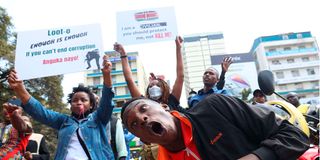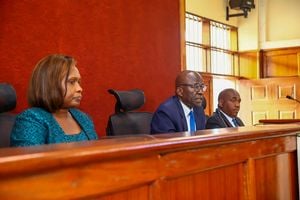Survey: Kenya’s private sector activity recovers after Gen Z protests

Anti-government protesters display placards along Moi Avenue in Nairobi on July 23, 2024.
What you need to know:
- Thousands of youthful demonstrators poured onto streets of Kenya’s major urban centres across the country in mid-June to oppose plans to enforce fresh and higher taxation measures from July, poor governance and alleged corruption in government.
- This prompted President William Ruto to drop the Finance Bill 2024 and dismiss about half of his Cabinet.
Kenya’s private sector activity grew in August--the first growth in three months-- reflecting easing economic uncertainties because of faded anti-government protests.
Findings of a closely-watched monthly survey released on Wednesday showed that businesses posted the first growth in sales since May, recovering from the sharpest fall in more than three years at the peak of youth-led protests in July.
Stanbic Kenya Purchasing Managers Index (PMI) — a measure of monthly private sector activity such as output, new orders, and employment — came in at 50.6 in August from 43.1 in the prior month, marking the first growth since May.
Readings below 50 signal a decline in month-on-month private sector deals while levels above point to growth.
The activity had fallen for two consecutive months due to business disruptions and delayed consumer spending decisions that followed social unrest as countrywide demonstrations against fresh taxation measures, elevated living costs, bad governance, and corruption shook President William Ruto’s administration.
“Output and new orders improved after slumping during the months preceding, as anti-tax protests have been fizzling out,” Christopher Legilisho, chief economist for South African-based Standard Bank, the parent firm of Stanbic Bank, wrote in the PMI report.
“However, concerns linger about consumer spending, with many firms noting overall demand as weak in a tougher economic and business environment. Consequently, firms cut employment after seven months of robust hiring; work backlogs therefore increased.”
The business conditions were on the downturn in June and July due to a drop in cash circulation, hurting demand for goods and services.
The PMI — based on feedback from about 400 corporate managers polled from key sectors such as agriculture, manufacturing, construction, wholesale & retail, and services — dropped from 51.8 in May to 47.2 in June and 43.1 in July.
The fall in July was the sharpest since April 2021 when Kenya announced re-imposed curbs and shutdowns to battle the second wave of Covid-19 infections.
Thousands of youthful demonstrators poured onto streets of Kenya’s major urban centres across the country in mid-June to oppose plans to enforce fresh and higher taxation measures from July, poor governance and alleged corruption in government.
This prompted President William Ruto to drop the Finance Bill 2024 and dismiss about half of his Cabinet.





